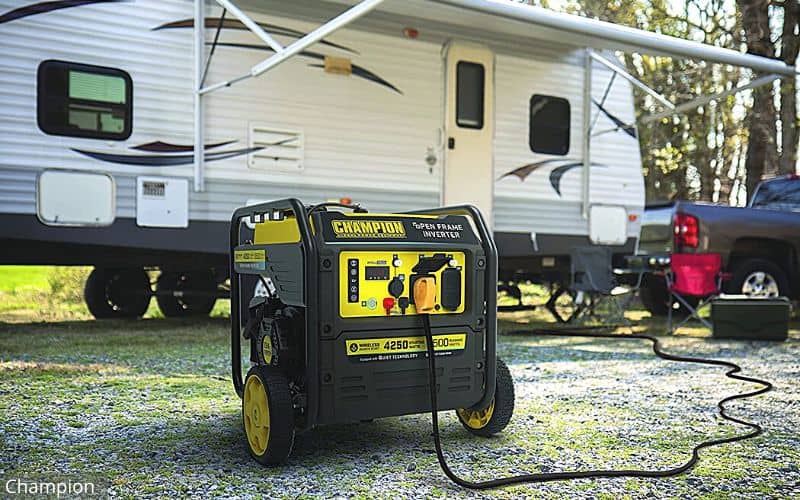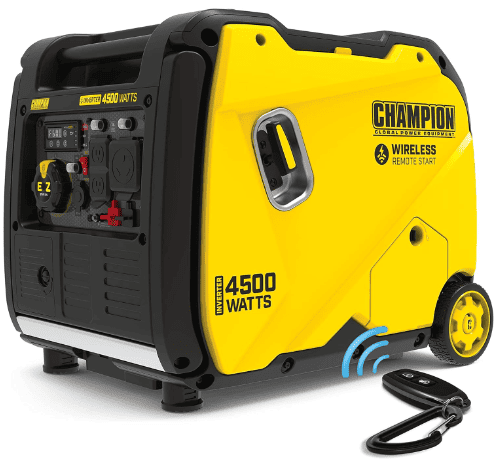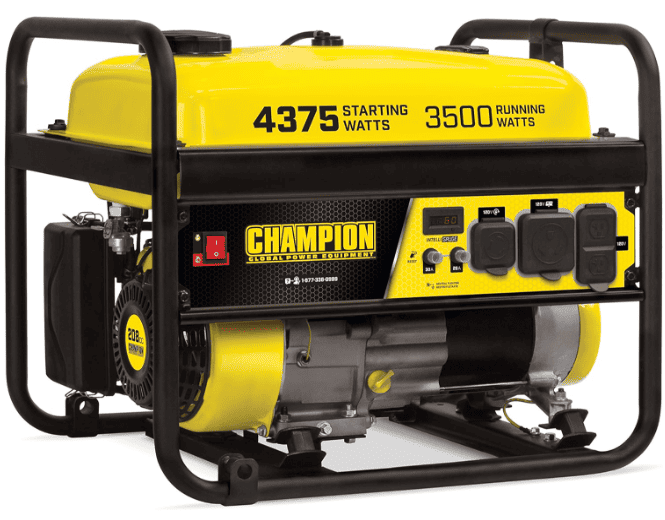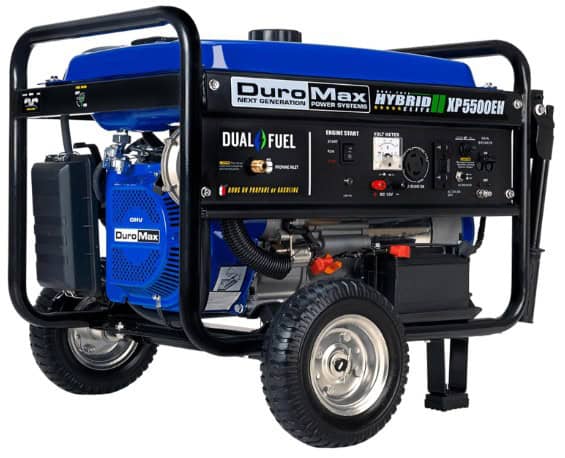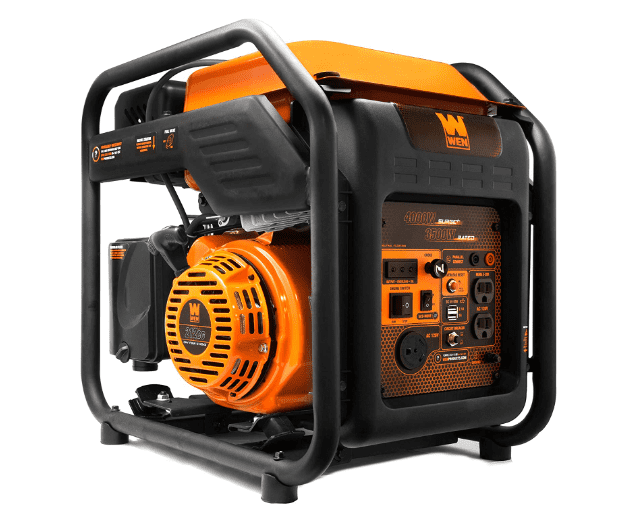If you’re looking for a 30 Amp RV generator, you’re in the right place.
In this blog post, we’re ranking and reviewing the 10 best 30-amp RV generators for 2025. By taking a look at each generator’s price, specs, and pros/cons. So you can decide which one is best for you, based on your needs and budget.
Plus, we’ll also provide a helpful buyer’s guide on what to look for when choosing a 30 Amp RV generator as well as answer some of the most common questions about RV generators.
But before we get started, we need to briefly go over amps, volts, and watts. So everyone is clear on what size and wattage generator is best suited for a 30 amp RV.
What Size Generator Do You Need for a 30 Amp RV?
To determine the generator size required for a 30-amp RV, we must first understand amps, volts, and watts, as well as how they relate to one another when it comes to RV power.
- Amps or Ampere – Unit of measurement that tells you the rate at which electricity flows through a conductor.
- Volts or Voltage -The pressure or force at which electricity flows through a conductor.
- Watts or Wattage The unit of measurement for power.
Now that we understand what amps, volts, and watts are, let’s use the below formula to figure out what size generator you need for a 30-amp RV.
Knowing that your RV is 30 amps and that all RVs in the US use a 12V/120-volt electrical system.
We can use the formula: Volts x Amps = Watts
To figure out how big or what wattage generator we need to power a 30 amp RV while off-grid.
Volts (120) x Amps (30) = Watts (3,600)
As you can see, you want to use a generator with an output of 3600 watts, or close to it, to power a 30-amp RV.
For more information on the size of generator you need for a 30 amp RV, check out our blog post “What Size Generator Do You Need for a 30 Amp RV?“.
Now that we’ve got that out of the way. Let’s review the best 30 Amp RV generators on the market today!
What are the Best 30 Amp RV Generators?

Below are our top picks for the best 30 Amp RV generators in 2025. To see the other best 30 amp RV generators, including the lightest and the best battery alternative keep reading.
- Best Overall – Champion Power Equipment Inverter Generator with Quiet Technology
- Quietest Operation – Westinghouse iGen4500 Super Quiet Portable Inverter Generator
- Best Affordable Option – Champion Power Equipment 100555 Portable Generator
- Best Dual Fuel Choice – DuroMax XP5500HX Dual Fuel Portable Generator
- Best Remote Start – Champion Power Equipment 200953 Open Frame Generator
1. Best Overall: Champion Power Equipment Inverter Generator with Quiet Technology
- Average Price: $900
- Peak/Rated Watts: 4500W/3500W
- Fuel Type: Gas
- Noise Level: 61 dB
- Run Time: Up to 14 Hours (At 25% Load)
- Weight: 101 lbs
The Champion Power Equipment Inverter Generator with Quiet Technology is one of the best 30 amp generators on the market today and is a great choice for those looking for a good all-around generator.
This RV generator receives top marks across the board on all the most important specs, including power, convenience, run time, noise level, and portability.
This Champion generator has a peak wattage of 4500 watts and a rated wattage of 3500 watts. Has a run time of up to 14 hours on a single tank of fuel (2.3 gallons).
Plus, it has a noise rating of only 61 dB, making it one of the quietest RV generators available.
Product Demonstration Video
Pros
- RV Ready with Built-In 120V AC 30A NEMA TT-30R Plug
- Parallel Ready (Optional Parallel Kit)
- Includes a 3-year Limited Warranty with FREE Lifetime Technical Support
- Digital Display that Shows Voltage, Frequency, and Operating Hours
- Cold Start Technology
- Extended Run Time with Easy-to-Read Fuel Gauge
- Remote Start
Cons
- More Expensive Compared to Other Similar Wattage Generators
- Small Wheels Make it Challenging to Roll Over Rough Terrain
2. Best Power to Size Ratio: WEN 56380i Super Quiet Portable Inverter Generator
- Average Price: $750
- Peak/Rated Watts: 3800W/3400W
- Fuel Type: Gas
- Noise Level: 57 dB
- Run Time: Up to 8.5 Hours (At 50% Load)
- Weight: 99.2 lbs
The WEN 56380i Super Quiet Portable Inverter Generator is one of the best RV generators for those looking for a generator that packs a lot of power into a small package.
This gas-powered unit has a peak wattage of 3800 watts and a rated wattage of 3400 watts while still maintaining a compact size, as its only 23.2 inches in length, 18 inches wide, and 20.1 inches tall.
This generator also has one of the quietest noise levels as well for its wattage, with a noise rating of just 57 decibels. Making this generator, quieter than a window air conditioner and the second quietest generator on this list.
Product Review, Test, & Demonstration Video
Pros
- Compact Design
- Very Quiet Operation
- RV Ready (With Built-In TT-30R Plug)
- Electric Start (With Built-In Lithium-Ion Battery)
- Easy to Read Digital Voltage, Wattage, Frequency, Run Time, and Fuel Supply Meter
- Portable Design with Built-In Wheels and Collapsible Handle
- ECO-Mode Switch Maximizes Fuel Economy and Run Time
Cons
- On the Heavier Side
- Does Not Come With Oil
- Small Wheels Make it Challenging to Roll Over Rough Terrain
3. Quietest Operation: Westinghouse iGen4500 Super Quiet Portable Inverter Generator
- Average Price: $850
- Peak/Rated Watts: 4500W/3700W
- Fuel Type: Gas
- Noise Level: 52 dB
- Run Time: Up to 18 Hours (In Economy Mode)
- Weight: 104.7 lbs
If you’re looking for a super quiet generator that can power your 30-amp travel trailer or camper, then you need to check out the Westinghouse iGen4500 Super Quiet Portable Inverter Generator.
This gas-powered unit has a peak wattage of 4500 watts and a rated wattage of 3700 watts, while maintaining a noise rating of just 52 decibels, making it the quietest generator on this list.
This generator also has one of the longest run times as well. With a run time of up to 18 hours on a single 3.4-gallon fuel tank, which doubles the run time of most standard generators.
The features and upgrades don’t stop there though on this top-of-line generator, as it also includes remote electric start, an LED data center, and plug-and-play parallel capability.
Product Review, Test, & Demonstration Video
Pros
- RV Ready with Built-In RV 120VTT-30R RV Receptacle
- Ultra-Quiet Operation
- Long Run Time
- LED Data Center Displays Fuel Level, Remaining Run Time, Power Output, Voltage Output, and Lifetime Run Hours
- Remote Electric Start (With Key Fob)
Cons
- Small Wheels Make it Challenging to Roll Over Rough Terrain
- On the Heavier Side
4. Best Affordable Option: Champion Power Equipment 100555 Portable Generator
- Average Price: $500
- Peak/Rated Watts: 4375W/3500W
- Fuel Type: Gas
- Noise Level: 68 dB
- Run Time: Up to 12 Hours
- Weight: 103.4 lbs
If you’re looking for a more affordable generator, you need to check out the Champion Power Equipment 100555 Portable Generator, as this budget-friendly option has an average price of just $500. Making it half as expensive as some of the more expensive models on this list.
Despite its cheaper price though, this generator still has plenty of power to run your 30-amp RV, with a peak wattage of 4375 watts and a rated wattage of 3500 watts.
If you’re concerned about noise, however, this generator might not be for you, as this Champion Power Equipment gas generator is on the noisy side at 68 decibels.
Comparatively speaking, though, 68 decibels is still pretty quiet, as this is roughly the same noise level a kitchen exhaust fan puts out on high.
Pros
- Affordable Price
- RV Ready with 120V 30A RV Outlet (TT-30R)
- Offers Cold Start Technology
- Offers Volt Gaurd which Protect Against Power Surges and Helps to Protect Sensitive Electronics
- Propane Hose and Adapter Provided
Cons
- Louder Open Frame Design
- On the Heavier Side
- Lacks Wheels
- No Electric Start
- Does Not Come with Oil
5. Best Dual Fuel Choice: DuroMax XP5500HX Dual Fuel Portable Generator
- Average Price: $700
- Peak/Rated Watts: 5500W/4500W
- Fuel Type: Gas/Propane
- Noise Level: 69 dB
- Run Time: Up to 19 Hours (Gas at 25% Load)
- Weight: 124 lbs
For those who want fuel flexibility, one of the best options is the DuroMax Dual Fuel Portable Generator, as this RV generator can run on either gas or propane.
This versatility is great during emergencies or extended trips when one fuel type might be more readily available than the other.
While gasoline typically offers slightly higher power output, propane burns cleaner, stores longer without degradation, and is often easier to transport in portable tanks.
The DuroMax’s ability to switch between fuels with a simple valve adjustment means RVers can take advantage of whichever fuel source is most practical or economical at the time, making it an adaptable choice for both planned usage and backup power scenarios.
Product Demonstration Video
In addition, this generator can also produce either 120 or 240 volts, has 100% copper windings, oversized wheels, all-metal construction, and a large easy-to-operate control panel.
In terms of noise though, the DuroMax XP5500EH Generator is on the louder side at 69 decibels. However, it’s not excessively loud and shouldn’t be too much of a problem for most people.
Pros
- Dual Fuel Operation
- Electric Start
- RV Ready with 120/240V 30A Twist-Lock Outlet
- Large Oversized Wheels
Cons
- Louder Open Frame Design
- On the Heavier Side
6. Cheapest Option: Westinghouse WGen3600v Portable Generator
- Average Price: $380
- Peak/Rated Watts: 4650W/3600W
- Fuel Type: Gas
- Noise Level: 68 dB
- Run Time: Up to 18 Hours (At 25% Load)
- Weight: 98.8 lbs
The Westinghouse WGen3600v is one of the most affordable 30-amp generators on the market. This reliable and durable generator has a peak output of 4650 watts and a rated output of 3600 watts.
It also has a very long run time of up to 18 hours at 25% load or up to 10 hours at 50% load, thanks to its excellent fuel efficiency and oversized four-gallon fuel tank. Making this budget-friendly generator ideal for boondocking and extended camping trips in the backcountry.
The only downside of this generator is its reduced portability, as it lacks wheels and weighs just under 100 pounds. Which makes it more difficult to transport and move around the campsite.
Unboxing, Product Demonstration Video
Pros
- Very Affordable
- RV Ready with One TT-30R 30 Amp Receptacle, and One L5-30R 30 Amp Receptacle
- Excellent Fuel Efficiency
- Long Run Time
- 3-Year Limited Warranty and Nationwide Customer Service Network
Cons
- Reduced Portability (No Wheels)
- A Bit on the Heavy Side
- No Electric Start
- Louder Open Frame Design
7. Best Remote Start: Champion Power Equipment 200953 Open Frame Generator
- Average Price: $700
- Peak/Rated Watts: 4250W/3500W
- Fuel Type: Gas
- Noise Level: 64 dB
- Run Time: Up to 14 Hours (At Minimal Load)
- Weight: 90 lbs
The Champion Power Equipment 200953 is one of the best RV generators with a remote start, offering a peak output of 4250 watts and a rated output of 3500 watts.
To see other generators with remote start, check out our blog post “8 Best RV Generators With Remote Start (30 & 50 Amp)“.
It comes with a wireless remote key fob that makes it super easy to start and stop the generator from up to 80 feet away.
In addition, it has a run time of up to 14 hours, which is pretty impressive considering its smaller fuel tank of 2.3 gallons.
Pros
- RV Ready with Built-In 120V AC 30A NEMA TT-30R Plug
- Parallel Ready (Optional Parallel Kit)
- Includes a 3-year Limited Warranty with Free Lifetime Technical Support
- Digital Display Shows Voltage, Frequency, Session, and Total Operating Hours
- Extended Run Time with Eco Mode
- Large Wheel Kit Adds Increased Portability
Cons
- The Attached Handle is a Bit Cumbersome to Use
- Plastic Wheels a Bit Flimsy
8. Lightest Option: WEN GN400iX RV-Ready Open Frame Inverter Generator
- Average Price: $500
- Peak/Rated Watts: 4000W/3500W
- Fuel Type: Gas
- Noise Level: 67 dB
- Run Time: Up to 7 Hours (At 50% Load)
- Weight: 70 lbs
One of the lightest 30 amp generators available today is the WEN GN400iX RV-Ready Open Frame Inverter Generator, as it weighs just 70 pounds. Making this gas-powered option 30 to 40 pounds lighter compared to similar wattage models. Which greatly increases the portability of this unit.
The WEN GN400iX also has a run time of up to seven hours at 50% load, which is decent considering its smaller fuel tank size of 1.75 gallons.
It’s also one of the most affordable RV generators, with an average retail price of only $500.
However, this generator does have a few drawbacks. To begin with, its noise level is a bit on the high side at 67 decibels, secondly, it lacks a wheel kit, which requires you to pick up and carry the generator. Due to its lighter weight though, this isn’t too big of a deal.
Noise Test Under Load Demonstration Video
Pros
- Lighter Weight
- More Affordable Price
- RV Ready with Built-In 120V AC 30A TT-30R Receptacle
- Parallel Ready
- ECO-Mode Switch
Cons
- No Electric Start
- No Wheel Kit
- Louder Open Frame Design
9. Best Battery Alternative: EF ECOFLOW DELTA Pro Portable (LiFePO4) Power Station
- Price: $3,500 (Yes, You Read That Right)
- Peak/Rated Watts: 7200W/3600W
- Fuel Type: LFP Battery
- Noise Level: N/A
- Run Time: Up to 3 Hours (Drawing 1000 Continuous Watts)
- Weight: 99 lbs
While we’re probably several years away from portable battery power being a viable alternative to gas and propane generators. For those early adopters with deep pockets, there are some portable battery options out there that can partially power a 30-amp RV in short bursts.
One of those is the EF ECOFLOW DELTA Pro Portable (LiFePO4) Power Station, which is rated at 7200 peak watts and 3600 rated watts.
I’m sure the first question you have though is how long can this battery power my RV. Well, the short answer is not for very long.
As battery technology just isn’t there yet that would allow you to swap out your gas generator for a reasonably priced battery alternative. For example, this outrageously expensive $3,500 battery power station can only supply about 3 hours of power at a continuous 1000-watt draw.
Product Demonstration Video
This means you couldn’t run your 11,000 BTU RV air conditioner for more than a few hours before you completely drained the battery.
Unless you expand the battery capacity of this power station, by adding extra batteries onto the power station for even more money.
With all that being said though, if you’re looking for an eco-friendly battery alternative to the gas generator and just need something to power your RV lights and a few small appliances, then this might be an option you want to consider.
Pros
- Eco-Friendly Power Source
- 30 Amp AC Outlet Socket
- Practically Silent Operation Except for Small Cooling Fans
- Parallel Capable for Increased Power Output (With Extra Batteries)
Cons
- Very Expensive
- Battery Capacity is Limited
- Requires Additional Complementing Batteries or Gas Generator to Expand Capacity
10. Most Portable: GENMAX GM3300i Portable Inverter Generator
- Price: $650
- Peak/Rated Watts: 3300W/3000W
- Fuel Type: Gas
- Noise Level: 60 dB
- Run Time: Up to 4 Hours (At 50% Load)
- Weight: 47 lbs
For those looking for the ultimate in portability in a 30 amp generator, the GENMAX GM300i is one of the best options, as this portable generator is half the size of comparable models and half the weight, at 47 pounds.
There are always trade-offs though when it comes to generators and the GENMAX GM300i is no exception. As this compact lightweight generator offers the least amount of power and wattage output on this list. With a peak wattage output of just 3300 watts and a running wattage of 3000 watts.
Making this generator slightly underpowered for a 30-amp RV.
This means you’ll have to practice power management, and it also means you won’t be able to run everything at the same time with this 30-amp generator. Especially, when it comes to higher-draw appliances like air conditioners, microwave ovens, hair dryers, and toasters.
Review, Product Demonstration Video
However, with a little power management, 3000 watts should provide more than enough power for basic everyday use.
That said, if you have a 15,000 BTU air conditioner or higher or a larger induction cooktop, it’s probably best to go with a higher-wattage generator, as this generator will more than likely not provide enough power to run these larger and more power-hungry appliances.
Pros
- Lightweight and Portable at Just 47 Pounds
- Quiet Operation at Just 60 Decibels
- Parallel Capable for Increased Power Output
- Includes 1-Year Warranty with Free Lifetime Technical Support
- Built-In 120V 30A Outlet
Cons
- Less Powerful
- Slightly Under Powered
- Smaller Gas Tank (1-Gallon) and Shorter Run Time
- No Electric Start
What to Look For When Buying a 30 Amp RV Generator

Now that we’ve gone over some of the best 30-amp generators, let’s talk about what to look for when buying one to make the process easier.
Power Output
One of the most important considerations when buying a generator for your 30-amp RV is to make sure the generator has enough power. Which as we’ve already discussed, should be at or close to 3600 watts to power a 30-amp RV.
Price
Price is another important consideration when purchasing an RV generator, as you want to make sure you’re staying within your budget and getting the most bang for your buck. Luckily though there are generators at all different price points for every budget, starting at about $350 and going up to $1,000 or more.
Run Time
Beyond power output and price, the next most important concern is the run time of the generator. Because you don’t want to have to constantly fill the gas tank while using it. So to avoid this, look for a generator that has at least an 8-hour runtime at a 50% load.
Noise Level
You’ll also want to take into consideration how noisy the generator is before making a purchase. After all, you don’t want a generator that’s so loud that it prevents you from having a normal conversation or causes constant complaints from camp neighbors.
Luckily though, most generators these days are relatively quiet, with some models not much louder than a bathroom exhaust fan. So when shopping for an RV generator make sure the generator has a decibel level of under 70 dB, preferably under 60 dB if noise is a major concern.
Fuel Source
Most generators will run on gas. However, some dual-fuel models can run on either gas or propane, which adds a lot of flexibility to the generator. Because while gas offers more power output, propane has an indefinite shelf life, is generally more fuel-efficient, and is less costly.
Size & Weight
Additionally, it’s important to consider the size and weight of the generator. Because you don’t want a generator that’s so large and bulky that it’s difficult to move around the campsite or takes up too much storage space.
When it comes to generator weight, most 30-amp models will typically weigh anywhere from 50 pounds on the low end to as much as 120 pounds on the high end. If portability is important to you though, you should look for a generator that is under 100 pounds and has a wheel kit.
Additional Upgrades & Features
The final factor to consider are upgrades or features the generator offers.
Many generators offer a wide variety of upgrades and add-ons to make it more convenient and user-friendly. Which can include electric start, remote start, auto shutoff, eco-mode, wheel kits, and LED readouts that monitor everything from volts and wattage to session and total operating hours.
Still, have questions about RV generators?
Check out our FAQ section below for more information.

Frequently Asked RV Generator Questions
The ideal wattage for a 30 amp RV generator is 3600 watts based on the calculation volts (120) x amps (30) = watts (3600).
However, a generator that produces exactly 3,600 watts is not required for a 30-amp RV; all you need is close to 3,600 watts and that has a 30-amp outlet.
This means a 3500-watt generator should provide more than enough power to a 30-amp RV, just make sure the 3500 watts are rated watts and not peak watts.
How big of a generator you need to run an RV AC depends largely on how big the AC is, different size RV air conditioners require different amounts of wattage, as you can see below.
11,000 BTU RV AC – Starting (2250W), Running (1100W)
13,500 BTU RV AC – Starting (2750W), Running (1250W)
15,000 BTU RV AC – Starting (3500W), Running (1500W)
Also, keep in mind that you’ll need enough wattage for the AC as well as all your other electrical RV requirements.
As your RV AC will rarely be the only thing running or using electricity inside the RV.
Because of this, to run an 11,000 or 13,500 BTU AC you should have a generator that has a rated wattage of at least 3600 watts.
And to run a 15,000 BTU AC you should have a generator that has a rated wattage of at least 4000 watts.
While comparable in fuel efficiency, propane is generally slightly more fuel-efficient compared to gasoline, which means it’s typically cheaper to run a generator on propane.
Recent Posts
When cruising down the highway in your RV, the last thing you want is a tire blowout! Not only is it dangerous, but RV tire replacement isn't cheap, costing $200 to $300 per tire. The good news,...
Nothing ruins an RV adventure faster than a breakdown with no way to fix it. Because of this, every RVer should have a well-stocked RV tool kit for those unexpected roadside emergencies and campsite...

